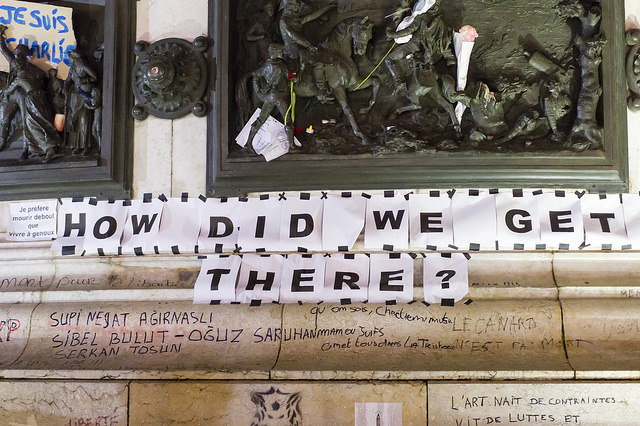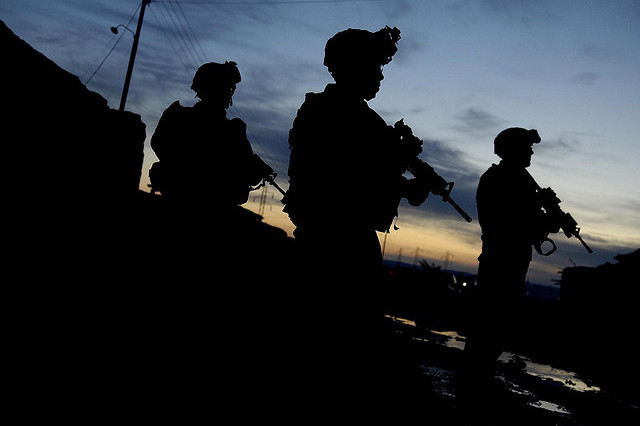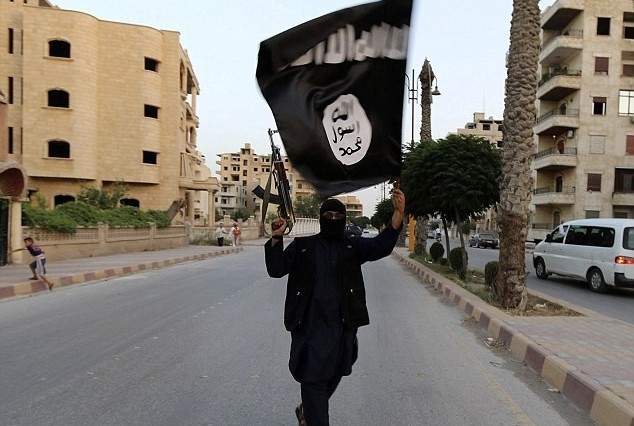by Shireen T. Hunter
The attack on the offices of the French satirical magazine Charlie Hebdo, by Muslim extremists reportedly affiliated with or sympathizing with al-Qaeda, is symptomatic of the many ills afflicting Muslim immigrant communities in France and other European countries. The killing of 10 magazine staff and two police officers as well as the deaths connected to the hostage-taking operations that followed both reflect and contribute to the growing tensions between considerable segments of European populations and Muslim immigrant communities.
These violent acts also underscore the failure of integration on the part of both Muslim immigrants and the receiving societies. Europeans generally find distasteful the insistence of many Muslim immigrants on practices such as wearing the hijab headscarf (or, even worse, the full-veil niqab), treating their women as if they were still in their countries of origin (and occasionally engaging in honor killings), or demanding that Sharia law should be applied to their actions. Even in the absence of such practices, some Europeans would still not be well-disposed toward Muslim immigrants. Of greater concern, ultra-nationalist and rightist parties focus on the behavior of some Muslims to inflame public animosity toward all Muslims. To create greater fear of the purported Islamization of Europe, some ultra-nationalists and rightists engage in actions designed to elicit negative and even violent Muslim reaction.
Further, the relative failure of the integration process means that many Muslim communities in Europe are economically and educationally far below the indigenous populations. For instance, the rate of youth unemployment among Muslim immigrants, even the third generation, is at least twice that of native Europeans.
The primary responsibility for some of these shortcomings rests with the Muslim communities themselves and their leadership. But European governments have also been slow in removing the barriers many Muslims face in getting jobs or a better education. Studies show that even assimilated Muslims find it harder to find jobs suited to their expertise, since many employers are more reluctant to hire Muslims as opposed to non-Muslim immigrants from non-European countries.
Consequently, Muslim immigrant youth, even those who are not particularly religious or observant, have succumbed to a deep sense of alienation. The combined effect of this acute sense of alienation and the lack of economic opportunities is a propensity to become involved in criminal activities and a receptivity to all kinds of anti-establishment ideas, which at the moment means extremist Islam. Moreover, these two factors tend to strengthen one another: involvement in crime, even petty crime, leads to imprisonment, and imprisonment often leads to radicalization. Studies have shown that a considerable number of immigrant youth have become radicalized while in prison.
Middle East Conflicts
Another factor greatly contributing to the radicalization of European Muslim youth has been the almost uninterrupted warfare in one form or another over the last 25 years directly or indirectly involving Muslim states or groups and one or several European/Western countries. These conflicts involving Muslims have in general exacerbated Europe’s immigration problem and contributed to the polarization of European societies over the issue of Muslim immigrants. Every wave of conflict—from Bosnia to Afghanistan, Iraq to Libya, and now Syria and again Iraq—has meant the arrival of new waves of refugees and immigrants already traumatized by war and conflict and hence mentally and psychologically vulnerable. Their arrival in European countries has also meant that immigrant enclaves have grown and the financial burden of providing for them has increased.
The end result has been an increase in unease on the part of local people, especially those who themselves are less well-off and hence prone to believing tales that the immigrants receive free housing and even cars while they themselves cannot make ends meet. As the recent debate in Britain indicates, these concerns even extend to non-Muslim immigrant workers coming from other European countries.
Recent wars have enabled radical groups, such as al-Qaeda, to expand their areas of influence, as happened in Iraq after 2003, and provided opportunities for new groups to emerge, as illustrated most dramatically by the rise of the so-called Islamic State. In short, war of any sort is not conducive to more participatory political systems and stable societies. On the contrary, the destruction of existing systems leads almost inexorably to fragmentation and conflict and thus creates ideal conditions for extremisms of all sorts to flourish.
These local wars and conflicts feed the sense of alienation of Europe’s Muslim youth. In order to find a sense of belonging and worth, these young people mistakenly gravitate toward the simplistic and one-sided explanations of extremists about the causes of their problems. They even risk their lives by either going to fight in local conflicts like Syria or engage in despicable acts of terror as happened in Paris. Often, the reaction to these acts is more war, in the form of a “war on terror,” and thus the cycle of violence continues.
In most cases, Middle Eastern states and actors have initiated this cycle of violence. For example, Saddam Hussein’s attack on Kuwait in 1990 sparked both the Persian Gulf War and later the Iraq war of 2003. Similarly, if al-Qaeda had not attacked the United States in 2001 by bombing the Pentagon and the Twin Towers, there would not have been the Afghan war. Similarly, if some countries had not spread their obscurantist vision of Islam or their excessively paranoiac view of the world, supported some radical groups as the instruments of their ambitions, and funded radical clergy who preach to Europe’s innocent Muslim youth and feed on their sense of alienation, we would not face the current situation.
Exiting the Cycle of Violence
The pressing question now is how to stop this cycle of violence, protect innocent people, and prevent any further killings, whether in the center of Europe or in the conflicts of the Middle East.
The first step, especially for European countries, is to realize that the problems of their Muslim neighbors and those farther afield are no longer those of distant lands. They have a direct bearing on European security and peace of mind, because these problems play out within their own societies, through their Muslim communities. Therefore, these problems can no longer be treated as merely external issues.
The second step is the realization that wars and the instrumental use of certain Muslim groups in particular cases have not solved Europe’s and indeed the West’s security dilemmas. On the contrary, this method has only created new dilemmas.
Once these first steps have been taken, the third step would be to concentrate on finding feasible solutions to problems bedeviling many Muslim lands. The West, in other words, should abandon its all-or-nothing quest for the absolute transformation of the Middle East. For their part, Muslims must realize that violent actions and wars are no more effective in solving their problems than military action has been in eliminating the West’s security problems. Muslims must also acknowledge their own responsibility in bringing about the miseries that have befallen them. If both sides are willing to take these steps, there’s a chance they can stop the cycle of violence and extremism and begin the phase of reconciliation and reconstruction.






Why can’t US academics and pundits have the insight and courage to straight out say that US wars of aggression against Muslim countries, including America’s torture of those who have resisted and been captured and detained, and/or Israel’s occupation and its treatment of Palestinians and Palestinian culture, history and identity, and/or France’s many decades of discriminatory policies against its (primarily Algerian) Muslim population, and/or France’s willingness to cut off political criticism of its policies toward the Middle East as anti-semitic, have fueled the anger that has resulted in these horrendous killings.
Are the deaths of over a million people in the Middle East and North Africa and the maiming and dispossession of so many million more so inconsequential, and the ‘war on terra’ and the seizure of resources so compelling that one must ignore the rationale, however misplaced, of those relatively very few people who are so angered by their dispossession that they will kill, as reason for continuing to blame and pummel all Muslims?
Why not finally be realistic, and stop manufacturing false narratives that continue to fuel war and repression?
This reader would disagree with: (1) the author’s characterization of Sadaam Hussein’s incursion into Kuwait, since she fails to mention Bush and Baker’s mousetrapping of Sadaam (as well as of their own Ambassador April Glaspie), and (2) her failure to look beyond the official narrative of 9/11, to U.S. cultivation of Islamic extremism.
At the same time, her suggestions at the end of her article are positive ones. This reader would also offer that the Russian initiative of involving all interested parties in a comprehensive dialogue (which the US has up to now obstructed if not sabotaged), is a positive one.
Finally, until we reject, once and for all, the neoconservatism, neo-liberalism and ‘corporatocracy’ running our foreign policy we will continue to make the same mistakes and perpetuate more of the same chaos and devastation all over the world, with the result that in the end, all but only a very few will suffer.
France should recall its Algerian Berber French footballer Zinedine Zidane head-butting the Italian player Marco Materazzi in 2006 World Cup Final, simply because Marco had (deliberately) insulted Zinedine’s sister, in order to provoke Zinedine into violence. To have Zinedine and Marco living in the same room and giving Marco full immunity from prosecution in the name of ‘freedom of speech’ while ignoring or punishing Zinedine for any violent reaction in response to Marco’s insults is bound to eventually lead to Marco’s violent death. And to condemn Zinedine, claiming Algerians are inclined towards violence, is skilfully avoiding complicity in the impending crime.
Insulting a European, alluding to his mother/sister, may not move him, whereas the same insult can provoke a Muslim into violent action. Cultural characteristics cannot change by enforcing harsh punishment or by providing ‘housing’ and ‘employment’; the same applies to a community’s religious convictions/sentiments.
With democracy should arrive greater responsibilities rather than arrogantly and skilfully taking on any barbaric protest as an irrefutable excuse/evidence to justify ‘continuing’ to insult a community in the name of democracy and freedom of speech while patronisingly calling for coexistence and unity.
The academics and politicians who ignore the Zinedine-Marco’s scenario fail to understand Muslims’ deep rooted cultural-religious convictions; they can only congratulate themselves as ‘civilised’ nations upholding slogans of ‘extremism’ can never alter our ‘democratic values’!
Mrs Hunter, you pointed out a few solutions at the end but unfortunately you failed to elaborate on the root causes of radicalization of the youth in the ME & NA. You may have kept the topic to discuss for another time but it is unfair to the disadvantage living in those regions because no one seems to speak for them and they themselves have no access to any media to express themselves! Let’s call spade a spade by saying that the subservient dictators who are ruling these regions with their iron grip in order to keep a lid on their own societies for the benefit of themselves and those who support them. Unfortunately the gutless and spineless politicians in the west who are subservient of their own corporations, once again for their own reelections and the prospect of future benefits and incentives that the corporations offer them, are supporting these dictators in order to rob them of their resources. In return, the corporations and the governments in the west provide them theses dictators with junk armament just for them to keep the lid on their mass population. Then the junky armaments are either destroyed in created wars between the dictators, such as Sadam Hossien against Iran or Kuwait, or the western militaries destroy them in order to replace or sell more junky armaments to both wearing parties and claim that “we are doing replacing the junky armaments with good intentions”. So no wonder that the youth of the nations in the ME & NA are pissed about the west? As you know the youth in the ME and to some extent in NA are well educated and they are frustrated with their own living conditions and lack of economicall opportunities but unfortunately NO ONES HOME TO LISTEN TO THEM! And they are left with no option but to become radicalized!
Shireen Hunter’s analysis leads me to draw our attention to some features of this very difficult issue.We are facing various,multiple ,extraordinary complex concerns which need to be specifically adressed while being interconnected.As a matter of example the recent massacre in Paris shows that terrorists involved there belong to a specific category :individuals involved first in criminal affairs ,as many in suburbs,who subsequently have joined the jihad.This category is made of criminal/terrorists,some of them financing partially their jihad with criminal business.(by the way,such a category is a worldwide one :talibans are financed with opium,maghreb and saharian Aqmi & other folks are both wealthy criminals and terrorists,etc).
In recent months,french public and politicians had focussed their attention on another category :youngsters who go to jihad for various reasons ( bad humor, family or personnal issues…).
Another concern is : we see a vast current of sympathy for Charlie which leads many people to avoid any question on Charlie’s behaviour which , according to my opinion,should be analysed not as a model for tolerance but ,rather as a model of old fashion post “revolutionary” May 1968 inheritance :Banning is forbidden.Charlie was hitting every single sacred value under the umbrella of free laughing.Beyond humor,this is simply sectarian hatre.No respect,no limit.This unavoidably feeds violence,division.Is french public opinion ready to open eyes? Not sure.In some public schools,some teachers wishing to promote sympathy to Charlie with sweet messages for tolerance,had brought some Charlie’s cartoons on classrooms’ walls.They faced some extremely harshed comments from some muslim pupils,while others mildly expressed their perplexity on a so-called right to insult muslim symbols……Apparently this attack has increased a malaise within french jewish community which seems more inclined than before to follow israeli appeals to migrate to Israël.Netanyahu jumped onto this occasion.Christians are facing an even deeper malaise :they are extremely sad with current bloody persecutions not only in the Middle East, but near everywhere (including Asia) at an unprecedent scale;but they are very upset by (fortunately rare) criminal attacks against them in France (from various sides : satanic sects,islamists,femens) which are mostly hidden and never brought before courts. They are facing as well hidden renewed anti christian campaigns from individuals and groups,lobbies which are very close to Charlie’s people.
It is urgent to push western audiences to enter into more in-depth thinking,judgement on these very complex issues,and to refrain from passionnate reflex.